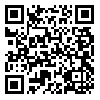Volume 8, Issue 1 (6-2021)
vacres 2021, 8(1): 1-8 |
Back to browse issues page
Download citation:
BibTeX | RIS | EndNote | Medlars | ProCite | Reference Manager | RefWorks
Send citation to:



BibTeX | RIS | EndNote | Medlars | ProCite | Reference Manager | RefWorks
Send citation to:
Zangeneh M, Khosravani-Nezhad Y, Alijani M, Farhoodi B, Massumi-Naini H, Siadat S et al . Two Months Follow-Up of 139 Unvaccinated COVID-19 Patients Based on Clinical and Imaging Data. vacres 2021; 8 (1) :1-8
URL: http://vacres.pasteur.ac.ir/article-1-238-en.html
URL: http://vacres.pasteur.ac.ir/article-1-238-en.html
Mehrangiz Zangeneh 

 , Yasamin Khosravani-Nezhad
, Yasamin Khosravani-Nezhad 
 , Mohsen Alijani
, Mohsen Alijani 
 , Behnam Farhoodi
, Behnam Farhoodi 
 , Hamid-Reza Massumi-Naini
, Hamid-Reza Massumi-Naini 
 , Seyed-Davar Siadat
, Seyed-Davar Siadat 

 , Masoomeh Mesgarian *
, Masoomeh Mesgarian * 



 , Yasamin Khosravani-Nezhad
, Yasamin Khosravani-Nezhad 
 , Mohsen Alijani
, Mohsen Alijani 
 , Behnam Farhoodi
, Behnam Farhoodi 
 , Hamid-Reza Massumi-Naini
, Hamid-Reza Massumi-Naini 
 , Seyed-Davar Siadat
, Seyed-Davar Siadat 

 , Masoomeh Mesgarian *
, Masoomeh Mesgarian * 

Department of Infectious Diseases, Faculty of Medicine, Tehran Medical Sciences, Islamic Azad University, Tehran, Iran
Abstract: (3954 Views)
Introduction: To understand the effects of COVID-19 vaccines it would be essential to have knowledge about the effects of the disease during the time that vaccines were unavailable. Hence, we tracked the clinical outcomes of Iranian COVID-19 patients during Feb 19th till May 1st 2020 by a longitudinal follow-up study of patients discharged from a university hospital in Iran. Methods: Demographic, clinical, and paraclinical data (chest CT scan imaging, and RT-PCR tests) of 139 patients were collected at the admission time. Preliminary clinical, radiological, laboratory, treatment information, and follow up results were extracted and collected from patients' records. Results: The mean age of the patients was 60.56±16.32 years. The most common symptoms on admission were dyspnea (79.1%), coughing (77.3%) and fever (73.1%). The common radiological pattern was multifocal patchy ground-glass infiltration. The patients were followed-up for 8 weeks by phone call. During discharge, 24.8% of the patients had no symptoms, the common residue symptoms were weakness and malaise (48.2%), dyspnea (38.7%), coughing (20.4%), hyposmia (18.5%). On week 8, 74.6% of the patients had no symptom. Moreover, 47.14% of CT scan results improved after 4 weeks and 43.39% after 8 weeks. Conclusion: Further follow-up studies are required to determine other detrimental illnesses related to the disease and how vaccination against COVID-19 can affect them.
Send email to the article author
| Rights and permissions | |
 |
This work is licensed under a Creative Commons Attribution-NonCommercial 4.0 International License. |

This work is licensed under a Creative Commons Attribution-NonCommercial-NoDerivatives 4.0 International License.



